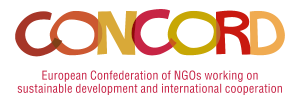The Ideal Interview of Josep Borrell
CONCORD’s views on the Hearing of the High Representative for Foreign Affairs and Security Policy
As HRVP in charge of “A Stronger Europe in the world”, Josep Borrell will be in charge of coordinating the external dimension of all Commissioners’ work, linking the internal and external aspects of EU policies and ensuring security for the Union. Policy coherence stands high in his Mission Letter stating that “our internal and external work are two sides of the same coin”.

After Jutta Urpilainen, it is time to imagine the perfect candidate and play the role model, one more time!
Challenges, priorities and vision for the job
- In order to ensure our external actions become more strategic and coherent, we need to collaborate much more between Commissioners’ portfolios. The weekly update on foreign policy to the College, proposed by President Ursula von der Leyen is a good step forward, but we also need to ensure more linkages at all levels of policy-making and between the institutions are a usual practice too.
- If “What we do at home will affect our place in the world”, we need to ensure Policy Coherence for Sustainable Development is embedded in EU’s policy-making process, as well as properly monitored and policies must be adjusted accordingly.
- A real “Geopolitical Commission” must consider the current world’s challenges. Climate change, rising inequalities and resources scarcity will impact the way we work with our partners globally. While being major challenges for the fate of humanity, they represent a good opportunity for Europe to put solidarity at the centre of its external actions and work collectively on tackling these challenges.
On Human Rights
- The European Union is based on a strong commitment on Human Rights. Today, violations of these fundamental rights are taking place all around the world and this is unacceptable. We need to put this commitment back to the core of our external and internal actions as well as take a strong stand against these violations.
- Human Rights must be a trademark of the Union and this needs to be translated into our trade policies, migration policies and external agreements, like the future EU-ACP Agreement. I will work closely with the Commissioners in charge of these policies to ensure Human Rights stay up and forefront in their agenda.
On Civil Society’s role
- CSO Roadmaps have been developed to build and facilitate a structured dialogue with EU Delegations and we should ensure the roadmaps are known, used and promoted by Heads of Delegations to the Delegations.
- In order to ensure civil society on the ground are engaged and consulted in different phases of each EU programme-design, EU Delegations should also work to the promotion of an enabling environment in the country they work.
- Civil society’s engagement should become an integral part of the EU’s political dialogue with partner governments. I will make sure this point will stay high in the future political dialogues between the EU and its partners and will be translated into real commitments in the future EU-ACP Agreement.
On the future EU Budget - the external instrument
- Both ODA and non-ODA actions have been put under the same funding envelope. This means there is a high risk that sustainable development and poverty eradication funding will be diverted to other external policy priorities. To avoid this possible prospect, we need to ensure that at least 20% of ODA is ring-fenced for human development and social inclusion and 45% for climate and environment.
- The €89 billion euro allocated to external instrument must respect the European Union’s international commitments, support sustainable development and be spent where it is most needed. I commit to ensure the NDICI will be elaborated and used in that sense.
On security and development nexus
- My take on this is clear: aid is a solidarity mechanism which aims at eradicating poverty and achieving the SDGs. Using ODA to serve security and foreign affairs interests is a slippery slope.
- SDGs will only be reached if progress in conflict situations and fragile states is speeded up. Peace-building is a cornerstone to sustainable development but it does not mean the EU can subordinate development cooperation and humanitarian aid to foreign policy interests. These are two different objectives which require different fundings, means and strategies.
On Policy Coherence for Sustainable Development
Ensuring internal and external EU policies are coherent is of utter importance but we also need to be more ambitious and ensure they contribute to sustainable development and the achievement of the 2030 Agenda. The spill-over effects of EU policies on partner countries such as trade, agriculture, migration or tax need to be properly addressed. Leaving No One Behind requires a more proactive role in monitoring these impacts and flagging incoherencies early on. This is what “A Stronger Europe in the world” also means for me.
